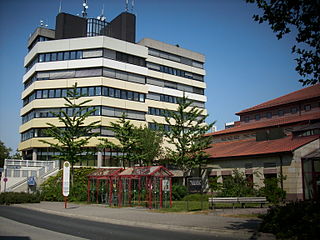Holzminden is a district in Lower Saxony, Germany. It is bounded by the districts of Hamelin-Pyrmont, Hildesheim and Northeim, and by the state of North Rhine-Westphalia.

Northeim is a district in Lower Saxony, Germany. It is bounded by the districts of Holzminden, Hildesheim, Goslar and Göttingen, and the state of Hesse.

Göttingen is a district in Lower Saxony, Germany. It is bounded by the districts of Northeim and Goslar, and by the states of Thuringia and Hesse.

Moringen is a town in the district Northeim, in the southern part of Lower Saxony, Germany. The town consists of the center Moringen and eight surrounding villages, Fredelsloh being one of them.

Northeim is a town in Lower Saxony, Germany, seat of the district of Northeim, with, in 2011, a population of 29,000. It lies on the German Half-Timbered House Road.

Hardegsen is a town in the district of Northeim, in Lower Saxony, Germany. It is situated approximately 15 km southwest of Northeim, and 15 km northwest of Göttingen.

The Göttingen Academy of Sciences is the second oldest of the seven academies of sciences in Germany. It has the task of promoting research under its own auspices and in collaboration with academics in and outside Germany. It has its seat in the university town of Göttingen.

Wulften am Harz is a municipality in Lower Saxony, Germany, near the towns of Northeim and Osterode am Harz.

Hans-Georg Stephan is a German university professor specializing in European medieval archaeology and post-medieval archaeology.

Medingen Abbey or Medingen Convent is a former Cistercian nunnery. Today it is a residence for women of the Protestant Lutheran faith near the Lower Saxon town of Bad Bevensen and is supervised by the Monastic Chamber of Hanover. The current director of the abbey (Äbtissin) is the art historian Dr Kristin Püttmann.

The Leine Uplands is a region in Germany's Central Uplands which forms a part of the Lower Saxon Hills and lies along the River Leine between Göttingen and Hanover. It borders on the Weser Uplands in the west, the Innerste Uplands in the northeast, the Harz in the east and Untereichsfeld in the southeast.
Gustav Abb was a German Nazi librarian.

The village of Ohrdorf lies in the north German state of Lower Saxony in the district of Gifhorn and belongs to the borough of Wittingen.
Klaus Grote is a German archaeologist and was director of the archaeological section of the Landkreis Göttingen until his retirement in 2012.

Karl Krolow was a German poet and translator. In 1956 he was awarded the Georg Büchner Prize. He was born in Hannover, Germany and died in Darmstadt, Germany.

Nordstemmen station is located on the Hanover–Göttingen railway and the Hildesheim–Löhne railway in the town of Nordstemmen in the German state of Lower Saxony. The station building was built by Conrad Wilhelm Hase (1853–1854), but it has not been used by Deutsche Bundesbahn or Deutsche Bahn since 1977. Since 2011, the Hildesheim contractor Dirk Bettels has tried in vain to acquire and rehabilitate the grade II heritage-listed station building with public funds. Construction work begun by Dirk Bettels was discontinued at the end of March 2013 because no contract had been signed by Deutsche Bahn.

The Royal Palace of Werla is located near Werlaburgdorf in Lower Saxony. The grounds of the royal palace cover about 20 hectares rising atop Kreuzberg hill, a 17 m high natural plateau overlooking the Oker river. In the Early Middle Ages the palace was an important place in the Holy Roman Empire, serving as an important base for the Ottonians in the 10th century in particular. Although it subsequently lost its political significance to the newly established Imperial Palace of Goslar at Rammelsberg, it developed into an independent settlement with a busy industrial quarter. In the 14th century it fell into ruin and was completely unknown until its rediscovery in the 18th century. The core fortress in particular was thoroughly excavated in the 20th century. Excavations carried out since 2007 have brought new understanding to the hitherto largely unexplored outworks. Since 2010 the palace complex with foundation and enceinte, as well as earthworks, has been partially reconstructed and is now open to the public as the Archäologie- und Landschaftspark Kaiserpfalz Werla.
Moritz Jahn was a Lower German novelist and an educator. He was also a poet, best known for writing poetry as well such as ballad, lyric, and narratives. Jahn was born in Lilienthal, a suburb in Lower Saxony to a Low German family. He was the member for Nazi Party. He has written notable books with narration such as Frangula and Lucifer. He was active from the 1920s to 1950s.

Einbeck-Salzderhelden station is the most important station in Einbeck in the German state of Lower Saxony. It is classified by Deutsche Bahn as a category 5 station and is located in the district of Einbeck of Salzderhelden.
Bodo Balthasar von Dewitz was a German art historian. His work focused on historical photography.
This page is based on this
Wikipedia article Text is available under the
CC BY-SA 4.0 license; additional terms may apply.
Images, videos and audio are available under their respective licenses.















